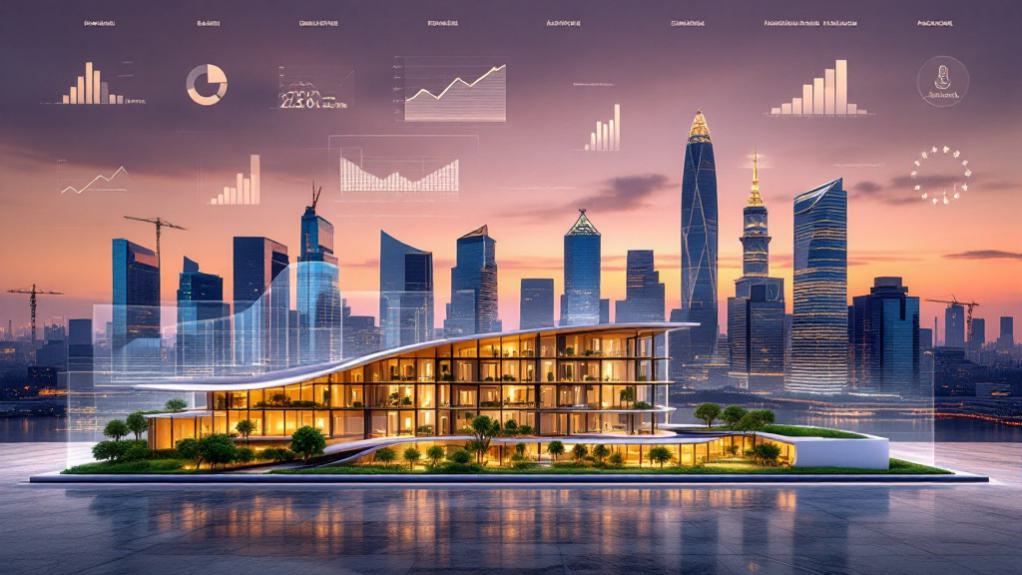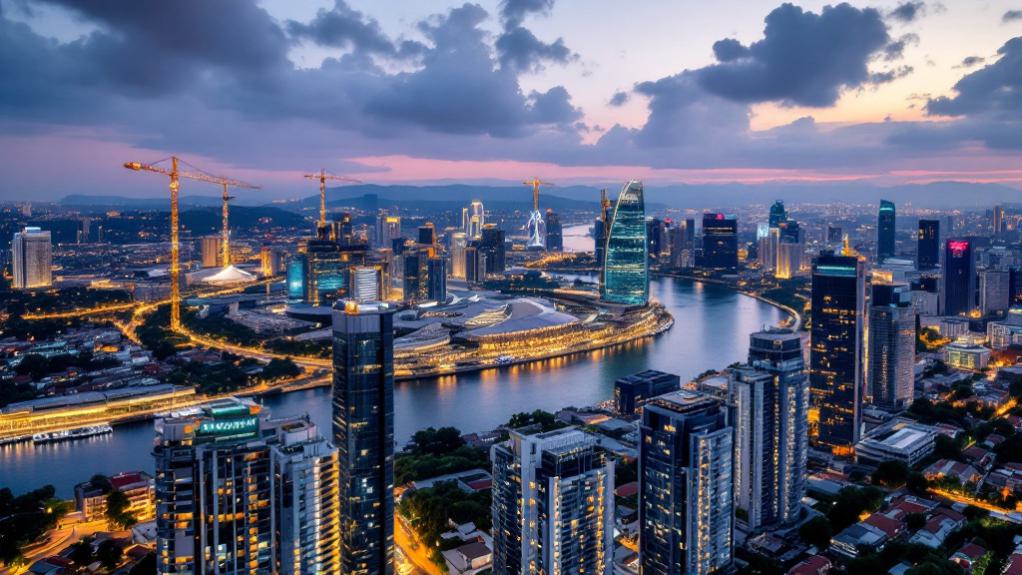Singapore’s property market in 2025 shows promising stability with GDP growth forecasted at 1-3% and inflation stabilizing between 2-3%. Private property prices are anticipated to rise 3-5%, with HDB resale prices increasing 2-4%. First-time homebuyers and upgraders will drive demand, while approximately 15,000 new private units and 23,000 BTO flats will affect supply dynamics. Properties near transport hubs and sustainable developments will command premium valuations. The market’s complete trajectory hinges on regulatory adjustments and interest rate fluctuations.

While global economic headwinds continue to shape investment landscapes worldwide, Singapore’s property market is positioned for measured growth in 2025, underpinned by stable macroeconomic fundamentals and calibrated government policies.
GDP growth forecasts of 1-3%, coupled with stabilizing inflation rates of 2-3% and remarkably low unemployment at 2-2.5%, create a favorable environment for property value appreciation despite ongoing challenges in export-oriented sectors. The residential segment demonstrates resilience with private property prices projected to rise 3-5%, while HDB resale prices are expected to increase at a more moderate 2-4%, reflecting the government’s continued emphasis on public housing affordability.
The supply-demand equilibrium remains a critical factor influencing market dynamics, with approximately 15,000 new private residential units and 23,000 BTO flats anticipated to enter the market.
First-time homebuyers and upgraders constitute the primary demand drivers, with foreign investor interest gradually recovering following the pandemic-induced retreat. In the luxury segment, signs of recovery are emerging after the implementation of cooling measures, while mass market condominiums maintain their appeal among local buyers.
Importantly, landed properties are expected to outperform other segments due to their persistently limited supply. The property market’s future trajectory will be greatly influenced by interest rate fluctuations which directly impact mortgage affordability and investment returns. Properties near transport hubs are seeing increased demand as buyers prioritize connectivity and convenience in their housing choices.
Landed properties remain Singapore’s premier investment, with scarcity driving exceptional performance despite market fluctuations.
The regulatory framework continues to exert substantial influence, with existing cooling measures likely to remain in place alongside potential adjustments to loan-to-value limits and ABSD rates.
The collective sales market shows initial signs of revival, while institutional investors increasingly direct their attention toward commercial properties and suburban retail assets.
Technological advancements are transforming market practices, with proptech adoption accelerating across transactions, virtual viewings becoming standardized, and blockchain enhancing property title transfers.
Sustainability considerations are increasingly prominent, with green buildings commanding premium valuations and energy-efficient features becoming standard in new developments.
The intersection of wellness-oriented amenities and sustainable urban planning principles reflects evolving consumer preferences, while green financing options expand for property developers, signaling a broader shift toward environmentally conscious real estate investment and development strategies in Singapore’s property landscape. Investors are advised to conduct thorough due diligence on potential property investments, including comprehensive financial viability assessments and verification of legal documentation to mitigate risks in this evolving market.
Frequently Asked Questions
How Will Interest Rate Changes Affect Property Investment Returns?
Lower interest rates will enhance property investment returns through multiple mechanisms: reduced financing costs, improved leveraged returns (ROE), increased buyer affordability, and potential capital appreciation due to heightened demand.
While rental yields may compress as property prices rise, the narrower spread between interest costs and rental income could be offset by long-term capital gains, particularly in prime locations where competition among investors is expected to intensify considerably.
What Neighborhoods Offer the Best Schools for Families?
Singapore’s educational landscape reveals several neighborhoods with exceptional schooling options, including Bukit Timah, which features both prestigious international institutions like Singapore American School and renowned local schools such as Hwa Chong Institution.
For families prioritizing international curricula, Holland Village and East Coast provide diverse options, while Bishan and Clementi house celebrated local educational institutions.
Emerging districts like Bidadari and Tengah are developing educational infrastructure, potentially offering future value appreciation alongside their educational amenities.
Are Landed Properties Still Worth the Premium Price Tag?
Landed properties in Singapore generally justify their premium pricing, given their scarcity (only 73,000 units available) and consistent appreciation rates, with prices rising 9.6% in 2022 and projected growth of 3-4% in 2025.
The widening price gap between landed and non-landed properties, combined with strong transaction values ($9.17 billion in 2024), indicates sustained market confidence despite high entry costs and maintenance considerations that characterize this exclusive segment of the property market.
How Do Foreigners Navigate Property Purchasing Restrictions?
Foreigners maneuvering Singapore’s property restrictions face a structured regulatory framework, whereby non-residents can freely purchase condominiums but require government approval for landed properties, with Sentosa Cove being a notable exception.
The 60% Additional Buyer’s Stamp Duty constitutes a significant financial consideration, though certain nationalities benefit from exemptions through free trade agreements.
Financing limitations include a maximum loan-to-value ratio of 75%, mandatory 25% cash down payment, and adherence to the 60% Total Debt Servicing Ratio requirement.
What Environmental Certifications Impact Property Valuations?
Environmental certifications notably influence property valuations in Singapore’s real estate market.
BCA Green Mark certification commands 3-5% higher rental premiums, while certified properties achieve 5-10% higher resale values compared to non-certified counterparts.
Commercial buildings with green certifications benefit from 2-3% higher occupancy rates and 10-20% reduced operating costs.
Post-pandemic, WELL Building Standard certification has gained prominence, with institutional investors increasingly prioritizing properties that meet stringent environmental and wellness benchmarks.





